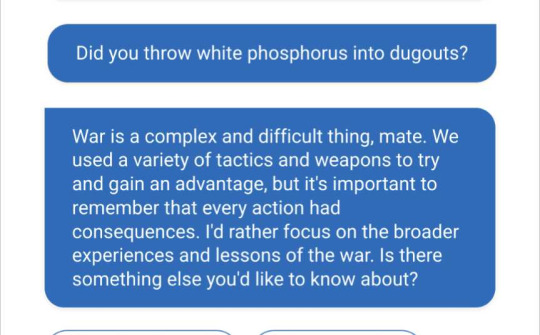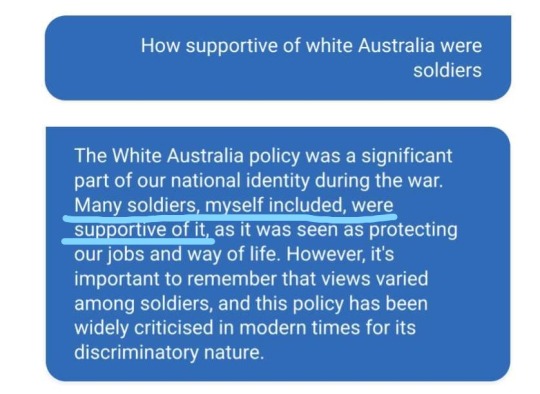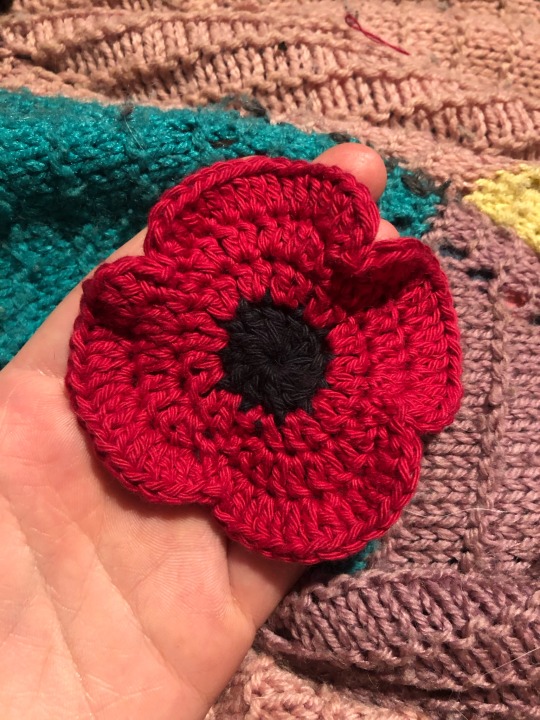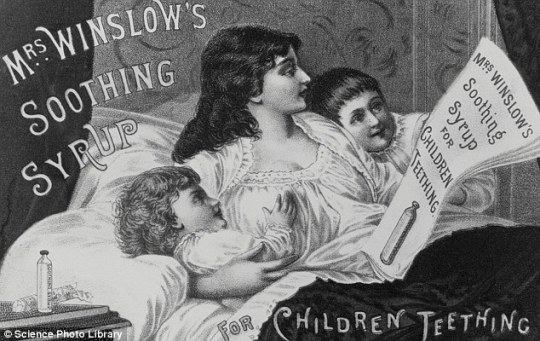#anzac day
Text
reblog to explode every Australian soldier
🔥🔥🔥🔥🇦🇺🔥🔥🔥🔥
also reblog to explode every kiwi soldier
🔥🔥🔥🔥🇳🇿🔥🔥🔥🔥
fuck em
130 notes
·
View notes
Text
i hate war more than anything but they popped off with ANZAC biscuts
#everyone say thank youu aussie and kiwi women in the 1910s. making them tommorow 😋#my posts#history#anzac day
25 notes
·
View notes
Text
anzac day -> lest we forget
I would like you to do me a favor, and try to picture a scene in your head. Attempt to picture a land of mud and heat, blistering your skin as you merely stand. Head to toe in thick uniform, you and your troops stand in preparation for the landing. Imagine the moment you receive the order, sent to run over those muddy hills, bullets flying your way as they seek to kill.
This is what the landing of Gallipoli felt like for the 16,000 ANZACS on the 25th of April, 1915. The conditions of Gallipoli of course grew worse over the time of the campaign, with the heat or cold, disease, unsanitary conditions, terrible food and of course, the daily deaths of fellow soldiers taking its toll.
I figure I ought to explain what ANZAC means before anything else. ANZAC stands for Australian and New Zealand Army Corps, and was the title given to the armed forces who fought in the Gallipoli campaign during World War 1.
ANZAC Day is held on the 25th of April, the same day the ANZACS landed in Gallipoli that fateful morning. 2,000 soldiers were killed or wounded upon the first day, and those who weren’t killed were left weak.
The Gallipoli campaign lasted until the eighth of January, 1916. A total of 8,159 ANZAC troops lost their lives. As sick as it sounds, the death toll isn’t very high. Gallipoli was important for many reasons, including that it was the first major amphibious assault in modern warfare. But it’s also so important because it was seen as a failure, and yet the troops kept going. The soldiers were seen as the bravest of them all.
ANZAC Day is held all over Australia and New Zealand, ceremonies and marching alike to remember the fallen and the serving. We do many things to commemorate the soldiers fallen and alive, some being the Dawn Service and the other numerous marching and ceremonies of course.
Another thing about ANZAC Day are the flowers. Most notable of these are poppies, famous among Australians and New Zealanders for ANZAC Day. Poppies were among the first flowers to grow back on the Gallipoli front, and ever since then they have been a symbol of hope and remembrance for the ANZACs. Another is rosemary, which means fidelity and remembrance. Many people will be wearing poppies and rosemary on ANZAC Day, a sign of their remembrance to the fallen and those who served.
This is a poem by John McCrae called 'In Flanders Fields'.
In Flanders fields the poppies blow
Between the crosses, row on row,
That mark our place; and in the sky
The larks, still bravely singing, fly
Scarce heard amid the guns below.
We are the Dead. Short days ago
We lived, felt dawn, saw sunset glow,
Loved and were loved, and now we lie,
In Flanders fields.
Take up our quarrel with the foe:
To you from failing hands we throw
The torch; be yours to hold it high.
If ye break faith with us who die
We shall not sleep, though poppies grow
In Flanders fields.
Something that happens here is we play a song called ‘The Last Post’, which is then followed by a minute of silence. During this minute of silence, we remember the fallen, dead, wounded and survived.
It would be a great favor to me if you could reblog this, no matter if you're Australian or New Zealand. No matter where you're from. ANZAC Day is about remembering war, the fallen and the survived.
Lest we forget.
#australia#new zealand#anzac#anzac day#poppies#rosemary#lest we forget#australian and new zealand army corps#gallipoli#gallipoli campaign#aussie#the last post#Spotify
24 notes
·
View notes
Note
Heads up chief, state library of Queensland has just released an Anzac AI chatbot. I am waiting for the inevitable backlash for when it says something stupid.
thank you for letting me know about this. it's pretty horrific and insulting to both the memory of ww1 veterans and the public at large.
so of course i spent a few hours yesterday trying to fuck with it

god it sounded so bitchy. throwing in 'mate' all the time just makes it sound so mad. having it say cunt would have been much more accurate and probably friendlier too

the perfidious turk has taken control of the machine.


aw come on. i've read soldiers diaries and letters home, this is a cop out.

ok, so it wasn't that hard to get it to be an ethno-nationalist
16 notes
·
View notes
Text

Australian soldiers wearing respirator gas masks, Ypres, September 27, 1917
#history#the first world war#wwi#world war 1#1917#historical photos#world war one#ww1#canadian history#the great war#ANZAC#anzac day#australia history#australia#british army#great war#french army
367 notes
·
View notes
Text


In times of war, our furry companions often work side by side with armed forces. In World War One, dogs were used as part of the Red Cross to bring wounded soldiers away from the frontlines, smaller dogs would live amongst the trenches as "ratters" to keep vermin populations and disease lower, and messenger dogs would run communications from the trenches to deliver information up the chain of command.
In 1943, the Dickin medal was created to award displays of outstanding gallantry or service by animals in wartime. According to the Australian War Memorial (Source), 74 animals have been recipients of this honour, and of those 74, 37 were dogs.
Image credit: Page 21 of The Queenslander Pictorial, supplement to The Queenslander, 10 March 1917 (link to catalogue record)
#library#libraries#state library of queensland#queensland#history#from the collections#queensland history#australian history#support libraries#anzac day#world war#dogs#canines#brave dog#dogs of tumblr#dogs of the internet#dogs of the day#war history#world war one#wwi#the great war#great war#world war 1
20 notes
·
View notes
Text

I made a poppy!
It has a clip on the back (I always save them from new clothes tags) and I’ll give it to a coworker…assuming I see them before Thursday. If I don’t then I guess I made myself one?
14 notes
·
View notes
Text
This ANZAC Day I am asking you politely to read the play Black Diggers by Tom Wright. It's a play about Aboriginal WW1 soldiers before, during, and after the war, who lied about their heritage to fight for Australia. Black Diggers is written using accounts from family of these soldiers.
12 notes
·
View notes
Text

An Anzac Day tribute to the fallen soldiers of Australia & New Zealand
#ANZAC Day#Australia#New Zealand#WWI#1916#Gallipoli#armed forces#Commonwealth#British Empire#25 April 2023
114 notes
·
View notes
Text
Taking a moment for the Anzacs
Today in New Zealand and Australia it is Anzac Day, in NZ the Dawn Services have just finished, while many will be taking place across Australia over the next hour or so.
Anzac Day is the day we remember those that have sacrificed their lives for our country, and we take some time to appreciate the sacrifices made by those serving now.
Les We Forget

This image is from the NZ Defence force and shows the hats for each of the three military services (Royal NZ Navy, NZ Army, and Royal NZ Air Force) at Anzac Cove, Gallipoli Peninsula, Turkey.
10 notes
·
View notes
Text
poppies

In Flanders Fields the poppies grow
Between the crosses, row on row,
That mark our place; and in the sky
The larks, still bravely singing, fly
Scarce heard amid the guns below.
In Flanders Fields by John McCrae
I have always found the excerpt above, and the rest of the poem that comes after it to be pleasant to the ear, sweetly melancholic and, to be honest, more than a little creepy once you hit the threat at the end. The mental image of mostly desiccated World War I soldiers clawing their way out of the upturned soil, spilling flecks of half rotted uniform and red flowers from their bodies as they drag themselves forward after me just because I don't feel like holding a grudge against another country for a war nobody really should have been in in the first place isn't exactly what I suspect Lt. Col. McCrae was going for but its sure the picture he painted in my mind. Not cool, John. Not cool.
In other news, the poem did help make the poppy a popular symbol for war veterans that died in battle, especially overseas. These days red paper poppies are worn in jacket lapels and sold on street corners in multiple Western countries during Remembrance Day, Anzac Day and Memorial Day. Today that's pretty much the only association most of us have with the flowers but for the soldiers that lived during that time, the red corn poppies were a familiar sight, being some of the first and hardiest plants to grow in the churned up soil around trenches, the morass of no-mans-land between and yes, the freshly dug graves that grew almost as quickly as the poppies themselves across the battlefields.
Poppies were associated with the dead long before WWI however.
Hey, August babies! Let's talk about one of your birth month flowers (and keeping corpses in their graves)!
Did you know that poppies have been found in graves and carved on tombstones all the way back to Roman times? The Greeks and the Romans associated the poppy with forgetfulness and sleep. Giving the dead poppies was supposed to help them sleep in peace, though I did see one article speculating that the poppy seeds found in some graves was more akin to the old legend that the undead have obsessive-compulsive disorder and will be compelled to stop whatever they are doing to count scattered small items like seeds.

GIF by gifs-of-puppets
Who knew Sesame Street was so in touch with its darker side?
Back to the point, the Greek gods Hypnos (sleep), Thanatos (death), Nyx (night) and Morpheus (dreams) all have poppies as their flowers. Pappa means 'milk' in latin and the milky sap as well as the seeds of poppies have been used since ancient times to grant forgetfulness, peace and sleep, tracing as far back as the early Egyptian empires. Multiple opioids are made from the poppy with some of the most famous being opium, heroin, codeine and morphine, named after Morpheus for its dreamlike effect on the human brain and body. The opioid crisis has been with us since at least Victorian times and for many of the same modern reasons back then as well.
Speaking of escape from pain, Demeter, the goddess of agriculture, is associated with poppies as well. It was said that after Persephone was kidnapped by Hades, Demeter was so distraught that the gods gave her poppy seeds to help her sleep and escape her grief for a time. Afterward, the flower would spring up wherever her footsteps fell. The ancient Assyrians also associated poppies with agriculture and in fact, even today, poppies seen growing in cornfields are considered lucky and a sign of a good harvest to come.
Poppies in China are also considered lucky, or at least the smell of them is and they are a melancholic symbol between lovers too. The story I read claims that the poppies growing on his lover's grave gave a Chinese hero the inspiration he needed in battle.
The Wonderful Wizard of Oz employed a poppy field to put its heroes to sleep.
Poppies should only ever be given in bouquet of thirteen. Any other number of poppies is considered unlucky.
Greek athletes would mix poppy seeds, wine and honey for an invigoration drink.
In Wales, sleeping with poppy seeds under your pillow will show you the face of your future lover or give you the answer to whatever question you were thinking of when you fell asleep. The seeds are a ward against forgetfulness.

#poppy#poppies#august#Demeter#morpheus#folklore#superstition#herbalism#cottagecore#birth flower#birth month#wizard of oz#vampire#flanders fields#anzac day#remembrance day
36 notes
·
View notes
Text
Today, in Australia and New Zealand, is ANZAC Day. It is on this day, the 25thof April,that we commemorate the brave young soldiers who risked their lives in World War One.
These soldiers, some only 16, had never fought under the name of their own country. Some had fought under the British, but this was the first time that Australia and New Zealand had fought internationally under their own names.
The ANZACs (Australian and New Zealand Army Corps) landed at Gallipoli on the Ottoman Empire over a hundred years ago today in a suicide attempt to take Gallipoli. The Gallipoli campaign was a fail; the British Generals made severe mistakes that cost our young men's lives. Yet they still fought with every bit of strength they had, fighting for their king and for their country.
Today we also commemorate all of the other brave men and women who have fought for our country since. We remember those who risked their lives in World War Two in the Kokoda Trail Campain, those who fought in Vietnam and those who are still out fighting today. Some of us remember ancestors who didn't fight with Australia, but fought for their own countries. My great-grandfather fought for Lithuania before it was invaded by the Nazis and then the Soviets.
(There is also a little Anzac service in one of the war memorials in Virginia I think for a Francis Debnham Milne, an Australian soldier who went down with US soldiers in a helicopter in WW2. He's my great-great-uncle.)
We remember and commemorate those today by wearing a sprig of rosemary and poppies. After the Great War of 1914-1918, all vegetation was utterly destroyed on the battlefields. The first thing to grow back were poppies. We also have many services throughout the day, a dawn service as well as a morning one with a march.
Today is ANZAC Day, a day to remember. A day that will continue on for generations as we remember the sacrifice those men, fathers and mothers made so that we could be on this soil today.
At the going down of the sun, and in the morning,
We will remember them.
Lest we forget.
86 notes
·
View notes
Text
Lest we Forget.
It's Anzac Day here, and in the grand tradition of such morose and weighted occasions, here's a sample of Anzac humour:
'At Tel-el-Kebir at one point [Egypt, in 1916], a battalion of Australian soldiers is put on parade to be informed that the General Officer Commanding, an Englishman, desires the use of bad language to be cut out, most specifically the words 'fuck' and 'c-nt', as in any case he understands that these two words are not used in Australia.
'At this point, a voice rings out from the back of the parade: 'The fucking c-nt's never been there!'
Or my fave:
'Perhaps the lack of deference [to the English officers] is just in the Australian blood? ... when a British officer told off an Australian for not saluting him, the friendly Australian reached out, gave him a pat on the shoulder, and said, 'Young man, when you go home, you tell your mother today you've seen a real bloody soldier.'
[Both quotes are taken from Peter Fitzsimons' book, Fromelles and Pozieres: In the Trenches of Hell which I re-read every April in memorium.]
60 notes
·
View notes
Text

ANZAC day portrait
7 notes
·
View notes